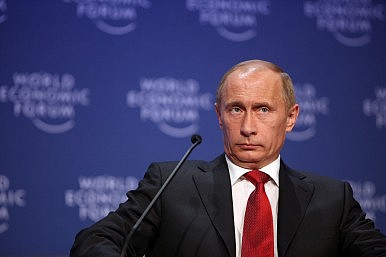
People around the world were astounded by Vladimir Putin’s rapid decision to annex Crimea in response to the latter’s referendum to secede from Ukraine and join Russia, which Kiev and the West view as illegal. The decision also drew worldwide criticism and vehement condemnation by the West and Ukraine, and triggered a second wave of economic sanctions from the United States, and soon afterwards Europe. Relations between Russia and the West are at their chilliest since the end of the Cold War.
So why has Putin risked Russia’s economic welfare and political space to swallow Crimea, push Ukraine out, and alienate the entire Western world? Is Putin “in another world” as German Chancellor Angela Merkel claimed he is? In my opinion, there are at least two considerations behind Putin’s decision.
The first is the realist, geo-political consideration. In Putin’s world, since the collapse of the former Soviet Union, Russia has lost nearly one fourth of its geography, one half of its population, and more than half of its GDP. Among the “lost” territories are those that are strategically important or militarily advanced, such as Ukraine and the Baltic states. With the eastward expansion of NATO, and the integration of former Soviet satellite states and republics in Eastern Europe and the Baltics into Europe, the traditional buffer zone between Russia and the West is increasingly squeezed and Russia’s space for strategic maneuvering becomes smaller with each year. When Russia craved for entry into the West, this might not have been particularly worrisome or embarrassing for Moscow. But since Russian leaders decided long ago that joining the West was neither particularly helpful to Russia’s political standing nor particularly attractive in terms of economic gains, it has begun to view the expansion of the West at its own strategic expense as both ill-intentioned and threatening.
Ukraine holds a unique position in Russia’s geo-strategic consideration. First, it is crucial territory in the passage of Russia’s oil exports to Europe. Each year more than one third of the oil Russia ships to Europe travels via the Ukraine pipeline. Second, Crimea gives Russia’s Black Sea Fleet access to the Black Sea. If the pro-West Kiev government were to have decided to end its lease to the Russian naval base in Crimea, Russia would have lost its strategic gateway to the Black Sea and the Mediterranean Sea. Third, Ukraine is deemed the most crucial member of Russia’s Eurasia Union project, an economic and strategic plan to closely connect Russia, Belarus, Ukraine, and Central Asia. If all goes according to plan, this union will integrate these former Soviet republics and now independent countries economically, politically, and diplomatically with Russia, and go some way to restoring the glory of the Soviet empire at its peak. The “coup d’état” in Kiev and the political orientation of the new government put all these things in jeopardy, if Russia remains disinterested and passive.
The second consideration is more psychological in nature. Following the end of Cold War, embracing the West was the first priority of Russian foreign policy. But to Moscow’s dismay, it found that the West still harbored strong reservations and considerable distrust. Years spent courting and wooing provided little of what Russia craved most: equal membership in the West and economic prosperity. Though Russia became part of the exclusive G8, it never enjoyed the full status and say of the other seven members, always remaining an “other.” Economically, the shock remedy proposed by the West and faithfully implemented by Boris Yeltsin didn’t bring the expected economic benefit. Instead, it took Russia’s economy into freefall, leaving the average Russian worse off than before. Russia’s look West ended in humiliation and disaster.
It was Putin who saved Russia from its miserable condition. He readjusted both Russia’s domestic and foreign policies, and distanced the country from the West, instead seeking opportunities to resurrect past Soviet glories. As the Russian economy improved, the West found that its time was passing. The 2008 economic crisis hit the U.S. and Europe hard and they found themselves more reliant on the emerging powers, Russia included. It is Britain, France, and even Germany who are now busy appealing to Russian oil barons to buy more and invest more. The balance of power between Russia and the West has shifted. The small war in Georgia in the summer of 2008 only strengthened this trend and the response from the West impressed Russia greatly: Europe is rotten and the U.S. has become too weak to lead. Then came the Arab Spring and the Syria crisis. In the former case, the U.S. “led from behind,” and in the latter it was Russia that decided the course of the Syria civil war.
Russians, and especially Putin learned a hard lesson from the post-Cold War romance with the West: For all the talk of democracy and freedom, the fact remains that the strong dictate to the weak.
With Europe rotten and United States weakened, a resurgent and confident Russia will definitely not let a geo-strategically important former Soviet republic fall entirely into the West’s camp. By annexing Crimea, Putin not only secured Russia’s naval base and its strategic gateway to the Black Sea, he also sent a powerful message to Ukraine and the West: Ignore Russia’s legitimate strategic concerns at your own peril.
Wei Zongyou, is Professor and Vice Dean of the Institute of International and Diplomatic Affairs, Shanghai International Studies University, Shanghai, China. His main research interests cover Sino-U.S. Relations, american foreign policy, humanitarian intervention and R2P.
(来源:http://thediplomat.com/2014/03/interpreting-putins-decision/)





